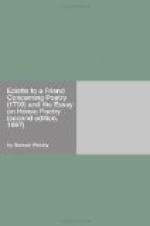Gondibert, or Orlando Furioso; all which have Fable
enough in ’em of any reason; but their principal
Actions might be still true, as we are sure was that
of the best Heroic that ever was written; (I need
not say I mean Virgil) since few or no Authors ever
deny’d that there was such a Man as AEneas, or
even that he came into Italy, built Cities there,
and erected a Kingdom, which Tully mentions, as a
generally receiv’d Tradition in those Parts,
and which it seems he thought not frivolous, but true
and solid; otherwise he’d scarce have given
it a place in his Argument for his Client. Of
this Opinion too seems Horace himself, in his Art
of Poetry, namely, That there’s no necessity
of the principal Action’s being feign’d;
for his Direction is, “Aut famam sequere, aut
sibi convenientia finge; Either follow Tradition or
Fame, or else feign what’s agreeable thereunto.”
He makes not feigning essential to Heroic Action,
but gives leave to follow Fame, who is not so great
a Lyar, but that she is sometimes in the right.
Nay, what if we should after all have Bossu himself
on our side, which I’m mistaken if he be not;
for these are his Expressions, Lib. 1. Cap. 7.
Le Fiction, &c. “The Fiction may be so
disguis’d under the Verity of the History, that
those who are ignorant of the Art of the Poet, may
believe it not a Fiction; and to make the Disguisement
well, he ought to search into History for the Names
of some Persons, to whom such an Action has probably
or truly happen’d, &c.” Hence ’tis
evident, that according to Bossu’s own Notion,
the main Action may be true; which appears even from
Aristotle himself, as quoted by him, 97. [Greek:
Kan ara] &c. “An Author is not less a Poet,
because the Incidents he recites have truly happen’d;
if so be that which happen’d had the appearance
of Truth, and all that Art demands, and be really
such as it ought to have been feign’d.”
And this Bossu himself illustrates admirably well
by an ingenious Simile; “A Statuary,”
says he, “first forms his Design, Posture, Altitudes
which he intends for his Image; but if he then lights
on any precious Material, Agate, or such like, where
the Figure, the Colours, and Veins will not be accommodated
to all he design’d, he regulates his Design
and Imagination according to his Matter; nor ought
we to believe, at the same time, that these singular
lucky Hits condemn the Justness of his Art.”
From all which, I must leave it to the Reader, whether
I han’t sufficiently prov’d what I’ve
undertaken; that Fiction is not necessary to the principal
Action of our Heroic Poem; on which I’ve been
something more large, not so much on my own account;
for ’tis indifferent to me by what Name any Man
calls my Poem, so it answers the great End of Epic,
which is Instruction; but because I’ve heard
some Persons have been so conceited as to criticise
on our immortal Cowley for this very reason, and deny
his Davideis the Honour of being an Heroic Poem, because
the Subject thereof is a true History.




